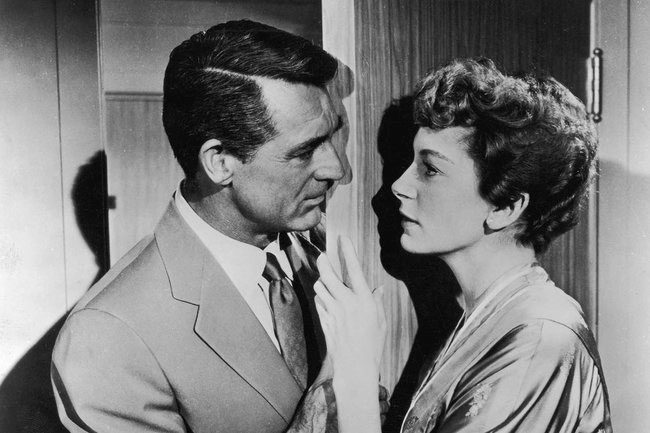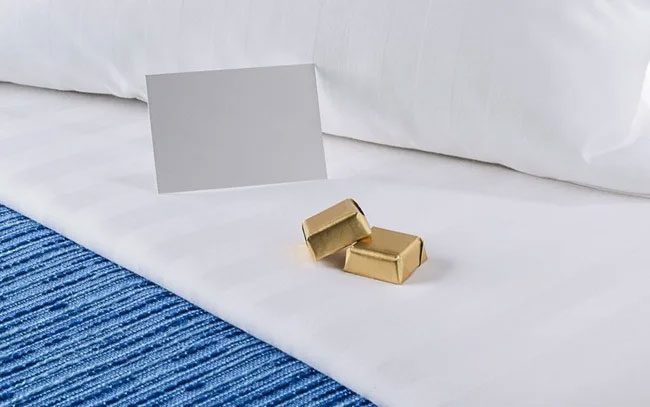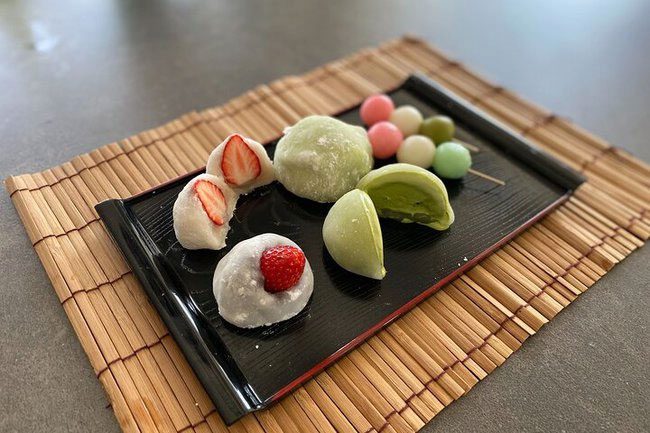To successfully run a hotel, managers and owners often come up with various “tricks” to win over customers.
In the hotel industry, managers often employ unique strategies to attract guests that may not occur to the average person. A small detail can be part of a broader communication plan. For instance, if you travel and find a piece of chocolate left after housekeeping has been done, this is a form of special “service.”

Chocolate left after housekeeping – a special form of service.
Gifting Chocolate After Housekeeping – A Special Service of Luxury Hotels
In the early 1950s, actor Cary Grant was staying at the luxurious Mayfair Hotel in downtown St. Louis. As a regular guest, he booked a penthouse suite to meet his lover. To surprise her, Cary Grant asked the hotel to arrange chocolate in a long trail starting from the living room, leading to the bedroom, on the bed, and up to the pillow, accompanied by a note he left for his lover, which included her name.
After this special guest’s visit, the hotel manager came up with the idea of placing chocolates on pillows during housekeeping. The hotel immediately received praise from customers, and even saw an increase in bookings, all while the cost of a few chocolate bars was quite low.
The hotel where Grant had his romantic rendezvous is now known as Magnolia Hotel St. Louis, and the management continues the tradition of placing chocolates on pillows in their rooms.

Actor Cary Grant. (Photo: Internet).
This method of enticing customers quickly became popular and is now practiced by most 4-5 star hotels. Some people argue that while chocolate can be high in calories, sugar, and fat, it also has numerous health benefits and can boost mental well-being. For those in the service industry, this is a part of their communication strategy.
Other “Variations” of Chocolate in the Service Industry
Over time, the practice of gifting chocolate has become common in budget accommodations as well. However, the accompanying gift is often a mass-produced square piece of chocolate without any branding. Therefore, to differentiate themselves, many hotels have “transformed” this into various other gift items.
Niko Penttinen, the room director at Mandarin Oriental Tokyo, stated: “For us, giving a gift after housekeeping provides an experience that reflects local culture. Most of our guests are international, so the hotel owner will leave mochi or another local specialty to promote the image of the country.”
“Chocolate is not a unique offering since you can find it anywhere in the world. But mochi is a way to introduce Japanese culture to visitors staying with us,” Penttinen added.

The accompanying gift is often a mass-produced square piece of chocolate.
Not only food, another hotel in Japan offers guests souvenirs. These products are mostly handcrafted locally, designed to convey cultural information and can be taken home as mementos.
In Provence, southern France, the 5-star Hôtel Crillon le Brave is nestled in a hilltop village of the same name, dating back to the 12th century, not far from Avignon. This hotel attracts tourists because it consists of original, rustic houses, all with views of vineyards and misty hills.
Guy Bertaud, the hotel’s executive director, says: “Visitors who come to us will receive a utility item or a small gift. The aim is to enhance their experience and promote local production.”
The gifts include homemade madeleines, a type of rich, small sponge cake originating from Provence. Cohen remarked: “When we do the evening turndown, we place a gift designed like a postcard with inspiring quotes, helping guests feel relaxed before bedtime.”

Mochi is a way to introduce Japanese culture to visitors when they come here. (Illustrative photo: Internet).
What Else Can Guests Take Home from Hotels?
In reality, most hotels around the world offer guests two small bottles of complimentary bottled water each day. These are placed in easily noticeable locations, along with instant coffee and tea bags. These items are included in the room rate, and you are allowed to take them without asking the hotel’s permission.
According to Moneycrashers, due to frequent travel and staying in various hotels, some guests have accumulated mini shampoos and body washes from hotels, saving a significant amount of money by not needing to purchase these items.
However, if guests take food from the minibar, such as soda, alcoholic drinks, fruit juices, or snacks, they will need to pay for them. Many hotels even place a price list in the minibar to inform guests. Prices vary according to each hotel’s policy. Additionally, items that incur charges include bathrobes, pillows, valuable decor, and amenities in the room such as TVs, minibars, beds, mattresses, and air conditioning…




















































